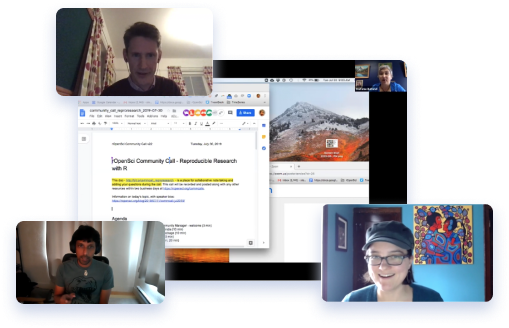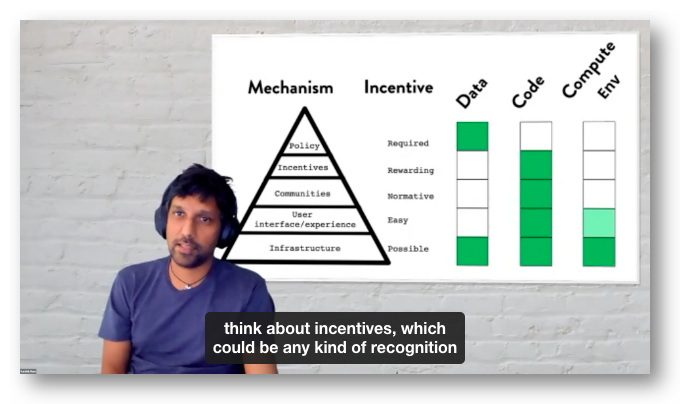Tuesday, February 2, 2021 From rOpenSci (https://ropensci.org/blog/2021/02/02/ropensci-community-calls/). Except where otherwise noted, content on this site is licensed under the CC-BY license.
In December 2020, Stefanie Butland, rOpenSci’s Community Manager, gave a presentation on community calls for Code for Science & Society Event Fund grantees and fiscally-sponsored project leaders. Emily Lescak, CS&S Event Fund Manager, led the discussion. This post builds on the summary post from that session.
rOpenSci community calls are online events with the fundamental goal of strengthening our community. We have the additional goals of reinforcing our mission and values, informing people on technical and social topics, bringing different stakeholders’ perspectives to light, and identifying unmet needs on a topic. Calls can include one to six speakers, or a moderated panel discussion. They run for an hour and consist of 40 minutes of presentation and 20 minutes for questions from the audience. Generally, our calls attract fairly large audiences1 and we see significant representation from academia, government, and industry.
To our delight, we have increasingly been asked to share our approach2. Therefore, in this post, we review the flow of community call development, from deciding on a topic to capturing the outcomes. We also highlight the strong social facilitation at every step, which is a key to our success. Many of the same principles apply to a wide range of virtual events for community engagement, so we hope these techniques will be broadly useful.

🔗 Choosing a topic
Typically, I (Stefanie) solicit ideas from the rOpenSci team and community. It’s best to keep the topic focused rather than trying to cover too much. Recently I’ve experimented with crowdsourcing ideas in a transparent way via GitHub. This has resulted in some rich public discussions that help focus and prioritize topics.
, labelled according to their status: 0/idea; 1/approved; 2/working on it; 3/completed](/blog/2021/02/02/ropensci-community-calls/commcalls-topics-gh-shadow.png)
Excerpt of suggested community call topics on GitHub, labelled according to their status: 0/idea; 1/approved; 2/working on it; 3/completed
To prioritize topics for the 2021 season, I pitched them to my colleagues and asked them to vote for their top five, using emojis on Slack.
🔗 Selecting and preparing speakers
Depending on the topic, it may make sense to invite a single speaker. More often, several short presentations or a panel discussion is more appropriate, bearing in mind that organizing regular events with multiple speakers is time consuming! The open topic discussions on GitHub can reveal potential speakers or people whom I might ask to suggest others who are not “the usual suspects”.
I start planning calls about two months in advance so that I can find a time that works for the presenters. I use a scheduling tool to narrow down a date and time. When scheduling, keep time zones in mind! Think about where your target audience is largely located and whether the time is welcoming for them to attend.
I schedule a one-hour pre-event meeting with speakers to introduce them to each other, have them share what they’re considering talking about, help them understand their audience, ask them what questions they think should be raised, and cover logistical details of the event. While the panelists are experts in their respective areas, they are not necessarily experienced in communicating with this particular community. I’ve found that these pre-event sessions lead to meaningful conversations that allow panelists to maximize their complementarity, and give a sense of a comfortable focused discussion during the event. I think this may actually end up minimizing their preparation time.
🔗 Promoting the event
Our community calls are advertised on our website, Twitter, and relevant Slack groups and mailing lists. With many people finding increased constraints on their time and more virtual events to choose from, I emphasize the specific value of each community call and what makes their content and style unique. Successful promotion benefits immensely from people sharing with related communities to which they belong.
 tagging those speakers in promotion of the community call](/blog/2021/02/02/ropensci-community-calls/commcalls-promotion-shadow.png)
Example promotional elements include speaker bios on the landing page for the Community Call and a tweet that others can share
🔗 Running the event
It is important to begin with a script consisting of introducing your organization, code of conduct, Zoom etiquette, noting the call is recorded, norms for asking questions, and introductions to the speakers. Attendees are encouraged to add their questions and take notes in a collaborative doc. This results in clear and concise questions for the moderator to choose from and can help lower barriers to participation. During Q&A, people are invited to unmute to ask their question, or the moderator can ask on their behalf. Over time, this practice of typing questions in the shared doc has led to attendees adding their own responses to questions, yielding a rich resource that harnesses distributed community knowledge.
🔗 Capturing outcomes and impact
We typically have 40-50 attendees, sometimes 90, and recently over 150. However, it’s important to think beyond numbers; even if there is a lower turnout, those in attendance are likely gaining a lot from the discussion. For example, our community call on involving multilingual communities had relatively low attendance, but led directly to our experiment with doing software peer review in Spanish.
Last year, Janani Ravi, a first-time attendee, went from adding her notes in our shared doc to having a byline on the rOpenSci blog. In her summary post about Maintaining an R Package Janani said:
…learning the right terminology/lingo/vocabulary is everything. It can take a few dozen blog posts and many hours of reading before beginners get to the ‘aha’ moment of ‘oh, these are the terms I need to use to search for what I’m thinking!’…There’s nothing like hearing a lively technical banter of experts to pick up the vernacular that one can easily build upon. That is the precise gap filled in by the timely and helpful rOpenSci Package Maintenance Community Call!
Don’t underestimate the value of sharing your success stories or anecdotes with your team and your community!
🔗 Artifacts of a community call
We frequently refer people to the content produced from past calls. The landing page for each community call acts as an archive that includes the video with closed captions3, links to speakers’ slides, collaborative notes doc, and resources on the topic.
- Landing page with all the things, including crowdsourced resources
- Public discussion that informed developing the topic and choosing speakers;
- Videos of all past calls;
- Collaborative notes;
- Summary blog post example.

Screenshot from video with closed captions
🔗 Final thoughts
Community calls are a great low-barrier way for new people to be exposed to your project and for you to hear what people are thinking about a topic. It takes a lot of time to do them well! It’s ok to start simple and evolve. To streamline the effort of organizing, work from a checklist. Where possible, be open and expose your ideas and progress to your community and encourage their input in the planning phase. Most importantly, be intentional. Think about what it’s like to be the speaker, or the person attending their first community call with your project and build a welcoming and valuable experience for them.
What tips do you have for us? Maybe we’ve borrowed some techniques you’ve been using for years! Are you applying some of what we’ve shared here? We’d love to hear from you in the comments.
The Wild World of Data Repositories was attended by 163 people from 19 countries on 5 continents. Maintaining an R Package was attended by 90 people from 18 countries. ↩︎
Woodley, Louise, Pratt, Catherine, Ainsworth, Rachael, Amsen, Eva, Bakker, Arne, Butland, Stefanie, … Tsang, Emmy. (2020, July 17). Using virtual events to facilitate community building: event formats. Zenodo. http://doi.org/10.5281/zenodo.3934385 ↩︎
Read about the evolution of our approach to adding high-enough quality closed captions to our videos. ↩︎

